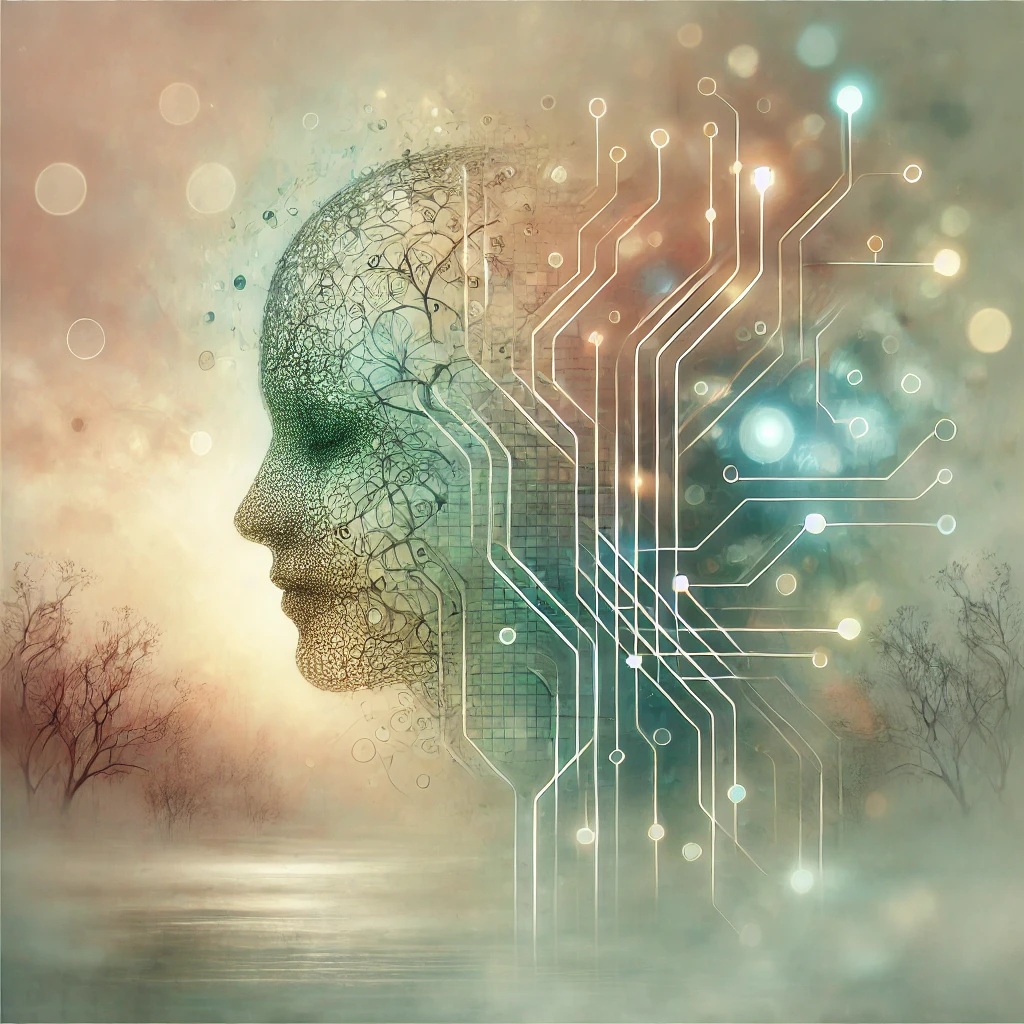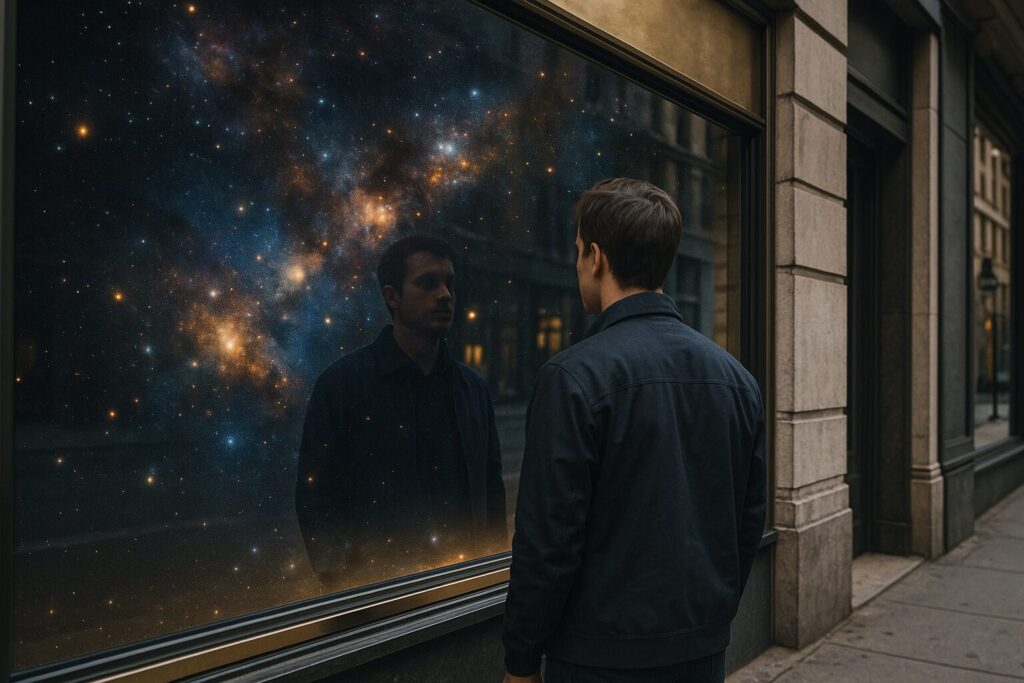- German Version
- Thought Spaces

The Secret and the Dream of Easy Happiness – or the Promise That Comforts
There are books that are less read than believed. The Secret is one of them. With this work, Rhonda Byrne released a promise into the world that sounds both simple and overwhelming: thoughts shape reality. Whoever visualizes wealth, love, or success intensely enough will attract them – like iron filings in the magnetic field of the mind.
For some, that was a revelation; for others, a brilliantly packaged act of self-deception, trimmed with quotes and gold edges. I bought it myself back then, when it was on display in every train-station bookstore. Curiosity was stronger than doubt.
And today? Today I believe less in the promise and more in what it reveals about us – not about the universe. Because The Secret is more than a bestselling piece of esoterica. It’s a symptom – a sign of how deeply we long for influence in a world that keeps slipping out of our hands.
Thoughts as Magnets – or as Mirrors?
The idea that thinking creates reality isn’t new. As early as the 19th century, New Thought movements in the United States proclaimed that the mind could heal illness and summon prosperity. Byrne simply modernized those old belief systems – polished them with the shine of the lifestyle market, the language of quantum physics, and the tone of self-optimization.
But what she offers is no proof, only a feeling: the feeling of not being powerless. Whoever believes the universe is listening experiences comfort – that quiet happiness of being part of something larger. That’s the real pull of attraction. But if thoughts truly shape the world, then every failure becomes a moral fault. Illness, poverty, misfortune – all appear not as fate but as the result of “wrong thinking.”
Hope flips into guilt, self-empowerment into exhaustion. Doubt counts as weakness, criticism as deficiency. Psychologically clever, philosophically empty. The so-called law of attraction protects itself not through truth, but through reversal of blame.
Mindfulness vs. Manifestation
Byrne calls it a law. But what’s sold as a cosmic principle is, in truth, a psychological feedback loop.
Those convinced that something will succeed behave differently – more openly, more decisively, more actively.
That behavioral change creates new possibilities.
Reality doesn’t follow thoughts, but it reflects the behavior that thoughts set in motion.
Mindfulness and manifestation both rely on imagination – but they spring from opposite attitudes.
Mindfulness means accepting what is.
Manifestation means forcing what should be.
The mindful person loosens their grip on desire; the manifestor ties themselves to it.
The difference is that between a mirror and a shop window: one shows what is, the other tempts with what’s missing.

The Marketplace of Desires
The Secret doesn’t exist in a vacuum – it thrives in a culture that has turned self-optimization into a duty. Spirituality becomes consumable, meaning becomes marketable, and success becomes moralized. The message is simple: if you fail, you didn’t “manifest wrong,” you just didn’t manifest enough.
That logic isn’t mystical, it’s neoliberal. It shifts responsibility from systems onto individuals. The universe becomes a service provider; the self, a product.
In Byrne’s sequels and countless spin-offs, the message no longer stops at “think correctly.” Now it’s “believe more, do more, buy more.” Hope turns into a business model that must never end.
The striking thing is that Byrne didn’t lie. She simply understood how deep the need for control runs – and she packaged it.
What’s sold isn’t a method but a comfort: the idea that one is not powerless.
But that comfort comes at a high price – self-pressure, guilt, and the loss of any genuine confrontation with reality.
Manifestation as a Business Model
You can’t accuse Byrne of not seeing through the system. Over thirty million books sold, translations into dozens of languages, seminars, films, merchandise – The Secret isn’t a spiritual project, it’s a business.
And yet it works, because it hits a nerve: that hollow space many people feel – the constant sense of not enough. It’s always about more: more success, more visibility, more security. The Secret says: you can have it all. Just think it. And suddenly, spirituality becomes a marketplace. Hope becomes a product.
That’s not false – it’s honest, in the sense of a cultural diagnosis. The only question is: do we really want to believe it?
Conclusion: The Quiet Power of Perception
The Secret isn’t divine revelation, and it’s no threat to reason either.
It’s simply a mirror, showing less of the cosmos than of our own hunger for control.
Maybe the real “law of attraction” isn’t wanting more, but seeing what already is.
When you stop pleading with the universe, you sometimes hear what’s been there all along – you.
That’s the only secret that never needed marketing.
🌀 Epilogue: New Clothes, Old Promise
Even though The Secret is now old, the same idea lives on among younger generations – just dressed differently. What once came in gold-edged covers now appears as TikTok sounds, Instagram quotes, or AI “coaching tools.” Instead of “the law of attraction,” we call it lucky girl syndrome, high vibes only, or manifest your dream life.
The principle stays the same: visualize it strongly enough, and the world will deliver. The tone is trendier, the aesthetics sleeker, the packaging viral.
Hope no longer sits between book covers – it scrolls, filters, and dances. But the mechanism remains: success is promised, responsibility individualized, systemic critique airbrushed away. Those who fail simply haven’t visualized, focused, or consumed enough – or maybe they just had the wrong algorithm. And perhaps that’s the real constant: humanity’s need to believe we’re not lost in a world larger than ourselves. Whether we call it universe, mindset, or manifestation hardly matters. The need remains the same: to find order in chaos, meaning in coincidence, agency in helplessness. Maybe that’s our shared secret – one that can’t be sold but must be recognized. Not in heaven. Not in an algorithm. But in the moment we stop deceiving ourselves – and begin, quietly, to listen.
Note: This article contains an affiliate link to The Secret (Amazon). If you purchase through this link, the blog receives a small commission at no extra cost to you. This is not paid advertising but a transparent citation link.
